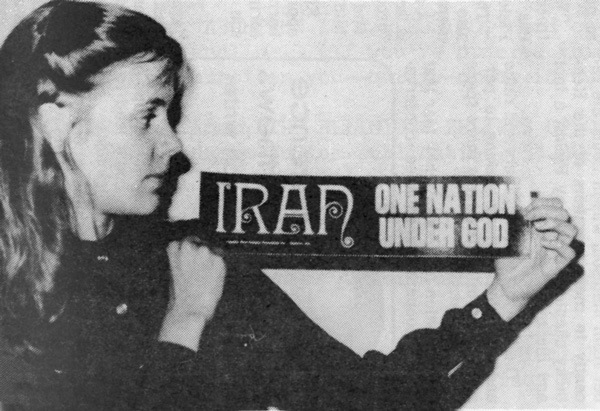
An answer can be found in the sentence doled out this week by the Islamic Republic of Iran to a human rights attorney there: 148 lashes and 33 years imprisonment. What were the “crimes” committed by Nasrin Soutoudeh that required such a draconian response? They included defending abused children and women arrested for not wearing headscarves, and protesting the execution of juveniles.
Forty years after the creation of the Islamic Republic, we see the theocratic chokehold continue, despite what looked like hopeful protests in the streets last year. The young woman waving her white headscarf on a pole during a demonstration seized international headlines and imaginations. Yet look at the fate of Soutoudeh, a 55-year-old mother of two teenagers, for working for basic human rights.
In December 1979, when the Grand Ayatollah Ruhollah Khomeini became “supreme leader” of the newly born Islamic Republic, FFRF released an ironic bumper sticker: “Iran: One Nation Under God.”
We thought there could not be a better cautionary tale about the dangers of mixing God and government than Iran’s Islamic revolution. Khomeini banned Western culture and denied Iranian women equal rights — forcing them into headscarves, terrorized the population with his religious police and theocratic courts, and began issuing “fatwas” resulting in the detention, torture and execution of tens of thousands of dissidents and “transgressors.”
The barbarity of Soutodeh’s sentence is rightly causing an international outcry, including by the U.S. State Department, which condemns it as “beyond barbaric.”
But, as New York Times columnist Nicholas Kristof notes today, the State Department has been silent about a similar miscarriage of justice this week in Saudi Arabia. Loujain al-Hathloul, 29, a leader of the Saudi women’s rights movement, went on trial yesterday, after being imprisoned and tortured. Her “crimes”? Communicating with human rights organizations and criticizing the Saudi “guardianship” policy, which subjugates women.
As Kristof writes: “If you care about human rights only in countries you despise, you don’t actually care about human rights.”
And if you care about human rights, you also cannot ignore the complexities of theopolitics — and the nefarious role of the United States in planting the seeds of the Islamic Republic of Iran. The CIA-orchestrated overthrow of Iran’s democratically elected prime minister, Mohammad Mossadegh, in 1953, and the U.S. backing of the Shah, Mohammad Reza Shah Pahlavi, ultimately put in motion the backlash that became the Iranian revolution.
Nevertheless, the brutal sentence of this champion of human rights in Iran shows exactly why secular government is essential to ensure women’s rights, human rights and freedom of thought. This is why we at FFRF do what we do.
